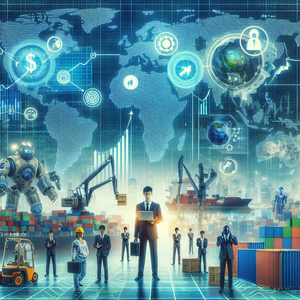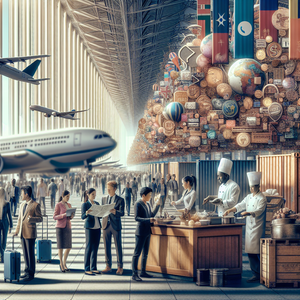
Careers in a Tariff-Driven Economy: Opportunities and Challenges Shaping the Global Workforce
Tariffs have long played a critical role in the global trade ecosystem, influencing the trajectory of industries, economies, and labor markets. In recent years, rising trade conflicts and evolving tariff policies have transformed the economic landscape, creating ripple effects that extend across employment sectors. While such policies often aim to protect domestic industries, they frequently bring unintended consequences, such as increased costs for downstream sectors or diminished export opportunities. These shifts create a dual-edged dynamic, presenting both hurdles and openings for businesses and workers alike.
Job Summaries:
Key Insights: How Tariffs Reshape the Workforce:
- Industries like manufacturing and agriculture are disproportionately affected by tariffs, leading to job redistribution.
- Protective tariffs create positions in some sectors while reducing employment in others.
- Rising demand for niche roles such as tariff compliance officers and trade policy analysts is evident, as companies adapt to complex regulatory landscapes.
- Global trade disruptions due to interconnected supply chains also require innovative solutions.
Trade Policy Analyst:
- Trade policy analysts evaluate the economic and industrial impact of tariffs, advising governments or organizations.
- They require a degree in economics or international relations, strong analytical skills, and expertise in global trade laws.
Supply Chain Manager:
- Supply chain managers optimize logistics and identify alternative suppliers to minimize disruptions caused by tariffs.
- A background in logistics or operations and excellent problem-solving skills are essential.
Nonprofit Operations Manager:
- Nonprofit operations managers address challenges like higher costs for goods due to tariffs.
- They streamline resources and negotiate with suppliers to ensure service delivery.
- A degree in nonprofit management or business administration is typically required.
Economic Policy Advisor:
- Economic policy advisors analyze trade data and develop strategies to support economic growth amid tariff changes.
- Advanced degrees in economics or public policy and strong data analysis skills are key.
Financial Risk Analyst:
- Financial risk analysts evaluate market volatility caused by tariffs and create strategies to mitigate potential losses.
- A strong background in finance or economics, along with certifications like CFA, is required.
Agricultural Economist:
- Agricultural economists analyze the impact of tariffs on rural economies and farming communities.
- They recommend strategies like crop diversification.
- A degree in agricultural economics is essential.
Manufacturing Operations Supervisor:
- Supervisors in manufacturing manage costs and maintain efficiency despite rising raw material costs due to tariffs.
- They optimize production schedules to maintain profitability.
International Trade Lawyer:
- Trade lawyers assist businesses in navigating tariff regulations and resolving disputes.
- A law degree specializing in international trade and strong negotiation skills are indispensable.
Customs Broker:
- Customs brokers ensure compliance with import/export regulations under evolving tariff structures.
- Certification and trade law expertise are key qualifications.
Corporate Strategy Consultant:
- Corporate consultants help businesses adjust to tariff-induced market shifts by analyzing competitive landscapes and exploring diversification strategies.
- Strong analytical skills and industry expertise are essential.
Logistics Coordinator:
- Logistics coordinators ensure timely delivery of goods despite trade restrictions.
- Adjust shipping routes and negotiate freight costs.
- A degree in logistics or supply chain management is vital.
Tariff Compliance Officer:
- Compliance officers ensure adherence to tariff regulations
- track policy changes
- update internal procedures to avoid penalties
Retail Pricing Analyst:
- Pricing analysts adjust strategies to balance affordability with profitability amid tariff-induced cost increases.
- They study consumer behavior and market trends.
Economic Researcher:
- Economic researchers investigate the long-term effects of tariffs on employment, GDP, and trade patterns, shaping policy decisions and corporate strategies.
Public Relations Specialist:
- PR specialists manage messaging for companies facing public backlash over tariff-related controversies.
- A background in communications and crisis management is essential.
The global trade landscape is constantly evolving under the influence of tariff policies, creating challenges and opportunities across industries. From trade policy analysts to supply chain managers and tariff compliance officers, professionals in these roles are at the forefront of helping businesses adapt to changing conditions. To stay competitive in this dynamic job market, individuals must cultivate relevant skills, stay informed about policy changes, and embrace innovation. By doing so, they can navigate the complexities of a tariff-driven economy and build resilient, future-ready careers.
Explore More Jobs

